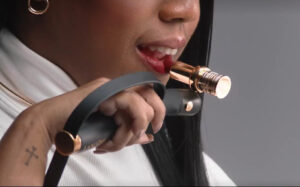
A decade ago, you would’ve been hard-pressed to find many makeup products designed for people of color. There were some options, but most shades, tools, and brands catered to white people.
Today, many people with disabilities might face a similar sense of exclusion when they browse the cosmetics aisle: There are often few, if any, products designed for someone with limited fine motor skills.
A team of L’Oréal engineers, researchers, and beauty experts is working to change this.
On Wednesday, at the annual Consumer Electronics Show in Las Vegas, L’Oréal unveiled a handheld, computerized makeup applicator called Hapta. It’s designed for people with limited hand and arm mobility.
Hapta is a nod to the word haptic, which is a type of vibrating motor technology used in many smartphones and in adaptive devices for people with disabilities. The product is expected to be available in US stores at the end of this year and globally next year at a cost of $149 to $199.
Guive Balooch, the global chief of L’Oréal’s technology incubator — the division that developed Hapta — said the move to create more advanced products for people with disabilities in beauty was long overdue.
Now, Balooch said the makeup world was approaching a revolution in technology that could help many with disabilities.
“The past three to five years has excelled in miniaturizing large-scale machines,” Balooch said. “Hapta is essentially a miniature robotic arm that requires lots of machine learning and complicated algorithms. Combine that with our sense of purpose and drive around inclusion, I truly believe this is the result of the marriage of these two forces.”
Makeup applicators for people with disabilities do exist. There are blush brushes designed to be easy to grip or mascara with a large handle that’s easier to steady with your fingers. Yet most of these products have been developed by startups or small businesses, not by a major cosmetics company. And L’Oréal says a high-tech option like Hapta isn’t on the market.
The feedback from Hapta testers with cerebral palsy, with Parkinson’s disease, and from people affected by a stroke has been positive, Balooch said.
“They told us they didn’t feel they could be part of this industry,” he said. “Having someone else apply it wasn’t enough for them. They wanted to apply makeup on their own. They now feel they can be part of this.”
Approximately 10 million Americans have essential tremor, a neurological movement disorder that often causes the hands to shake. Nearly 1 million people in the US have Parkinson’s disease, and some 764,000 Americans have at least one symptom of cerebral palsy. Both Parkinson’s and cerebral palsy can affect hand and arm mobility.
“People who could never apply lipstick before can now do that,” Balooch said. “There’s a confidence that comes from that. That’s what our user feedback has been.”
L’Oréal began developing Hapta about a year ago, after Balooch met with Anupam Pathak, the CEO of Liftware, a startup that created high-tech eating utensils for people with a tremor or limited hand or arm mobility. Pathak and Balooch started talking about how Liftware users asked whether the company could create tools for applying makeup.
“This was codesigned with people with cerebral palsy, people with Parkinson’s, and experts in the field,” Balooch said. “I hope this will inspire the industry. It’s not just something that these people deserve — it’s deeply linked to our purpose.”
Over the past few years, Balooch said, L’Oréal engineers have been working to make the company’s packaging easier to open for people with disabilities. L’Oréal has also been expanding the use of QR codes on its products to help people with limited visibility learn more about an item.
Hapta is set to be compatible only with Lancôme lipsticks for now, though L’Oréal plans to create fittings that would make the device adaptable with other lipsticks.
“The reality is that people who have motor-skills or hand-mobility impairments need to be able to do daily tasks,” Balooch said. “It is time for this type of technology.”












